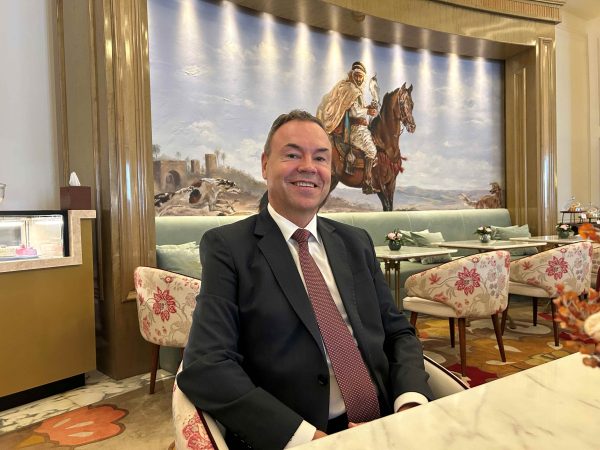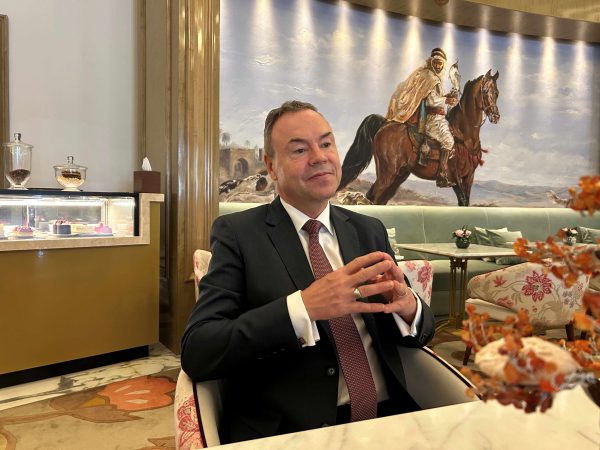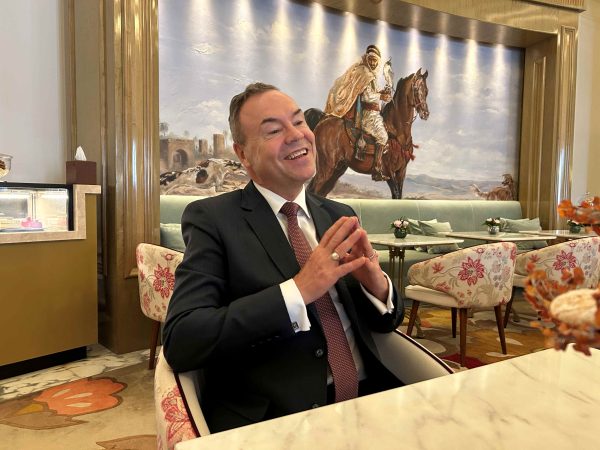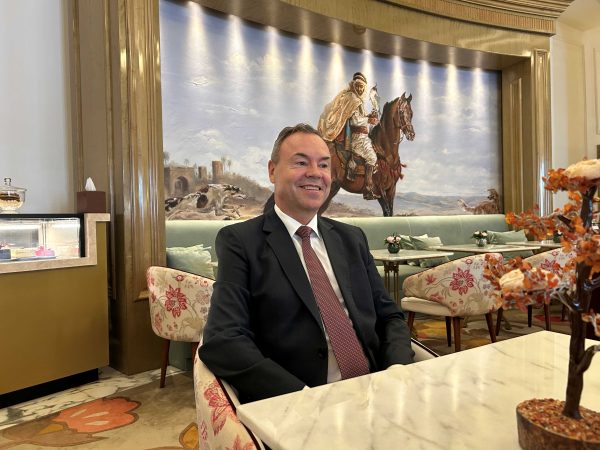Stefan Rådström: the hotel manager who went from architect to engineer of personalised experiences

Stefan Rådström’s vocation is not in buildings, but in people. The Swedish-born hotel manager believes that the essence of hospitality is to give from the heart – personally, honestly and exactly the way the guest wants it. Interestingly, the Swedish professional, who is Complex General Manager of the Al Habtoor City Hotel Collection, which operates three premium hotels in Dubai (Al Habtoor Palace Dubai, Hilton Dubai Al Habtoor City, V Hotel Dubai, Curio Collection by Hilton), is back in Hungary after a quarter of a century of vibrant professional relations.
– My career in the hotel business was a fluke. I studied civil engineering. I still had two years left to get my degree, but in the meantime I got a job as a student garbage collector in a hotel back home in Sweden. I said: okay, maybe it’s not the best job in the hotel, but then I’ll be the best garbage collector ever. So I would go into the cold kitchen in the mornings and while the garbage man would usually just go in, empty the garbage and disappear, I would go to where the big ladies were cutting away and say, „Good morning ladies! What a beautiful day today. Do you have garbage and waste for me? To which they said, is that normal?… „Oh, how sweet,” Stefan Rådström begins the story with a smile, „I did that for a couple of weeks, and then the food and beverage manager came to me and said: ‘Mr Rådström, you seem to have a very good attitude. Would you like to leave the garbage and work in the restaurant? I said, sir, I’ll be there tomorrow morning.

So I worked in the restaurant and then I went everywhere. I was working day and night, and I was like, wow, that was fun. Then when the summer ended and I had to go back to university, I didn’t go on the first day. Then they called me and asked me, are you coming or not? I said, let me try it out, put it off for a year – but then I never went back. I ended up working in Sweden for six months, and then two friends and I took jobs abroad – which was 36 years ago.
I worked in Norway for six years, then moved to Russia, then Poland and from there to Hungary. Then from Hungary to Russia, then again to Poland, then to Qatar, and from Qatar to Goa, India, where I spent five years. Then I moved to Turkey, to Istanbul. From there to Oman and then from Oman to Dubai. From Dubai to the Czech Republic, Prague, and now back to Dubai.
– What fascinated you most about the hotel sector?
– I think the fantastic thing about the hotel industry is that you get to work with people and get immediate feedback on your work. In other professions, you might do something today and only see the results three years later. But in hotels, you can feel the impact immediately: all it takes is someone saying, „thank you, that was wonderful”. Whatever you do, you get some kind of feedback. They’ll either shout at you or praise you – but at least you know what they think. It’s like sport. It’s like a team game. Tennis, for example, is individual: it’s all about you. But in a hotel, you can’t be successful without a good team behind you. It goes hand in hand. My success is my team’s success, and the team’s success is my success.
– What kind of people are you looking for? What do you consider most important in team building?
– Most of all I look at personality. Because someone might have a huge amount of knowledge – say they’re the best chef – but if they don’t have the right personality, they won’t fit in and I won’t get the most out of them. But if someone has a fantastic personality, I can almost certainly pass on the right professional knowledge to them with my team. But mentality cannot be taught. That’s why I need people with the right mentality, because anyone who pretends to have that mentality will soon find out the truth.
For me, hospitality is about giving from the heart to the heart. We are in this industry because we care about people. Not for the best pay. Not for the shortest hours. Hospitality is generally regarded as one of the lowest paid industries, but also one of the longest working hours. Yet we are a passionate community because we love what we do.
I always say we don’t do multi-million dollar business mergers and we don’t send people to the moon. Our job looks simple from the outside: to put a smile on people’s faces. But sometimes it’s difficult because every guest is different, and so you can’t generalise in the world of hospitality. It’s no coincidence that today’s trend is all the more about personalisation than ever before, given the huge competition. That’s why we at Al Habtoor Palace Dubai try to offer what the guest really likes – not just some mediocre solution that everyone just shrugs off as ‘okay’. In turn, if everyone really gets what they really like, they say „wow, that’s really for me„.

– How do you think the rise of mass tourism has changed the world of travel and the expectations of travellers?
– I think people today travel for the complex experience. It used to be that someone might go to a hotel just because it had a big name. Today, the purpose of travel is the experience itself – in a country, in a place, in a culture. And only then comes the question of where to stay. And social media reinforces this: it’s where we share our experiences, our feelings, our memories. We can’t run out of content – we need to travel so we have something to post on Facebook or Instagram to show our friends what a good life we have. This approach has changed so much and is pushing us to be creative and deliver experiences that speak to the guest personally. Specifically tailored to them.
So when it comes to personalisation, I always have to be one step ahead of the customer. When someone first arrives at a hotel they’ve never been to and the bellboy calls them by name, their first reaction is, „How did you know my name?” And that makes you feel special. I’ve never met a person who didn’t like to feel special. That’s what the big hotel chains struggle with: how can they really differentiate themselves? Because they are all beautiful, the staff are friendly, the food and drink is great, the cleanliness is good – it’s now considered standard in a five-star hotel. But how do you differentiate one from the other? I think the key is personalisation, making it feel like a homecoming.
– What do you learn from working in different countries?
– First of all, you learn culture. I feel blessed to have been able to work in so many countries and meet so many people – that’s how you build a network that is constantly growing. Now, wherever I travel in the world, there is always someone I know. It’s very rare that I go somewhere where I don’t know anyone. In a life like that, you become incredibly culturally rich: you understand different religions, different ways of behaving, how what is perfectly natural in Europe can be offensive elsewhere. In Thailand, for example, you should never touch someone’s head – it’s the ultimate insult. But if you don’t live there, you don’t know that. These experiences enrich you and broaden your horizons. Because if you only live in one place, it’s easy to become narrow-minded. But it also gives you a greater understanding of why things happen in the world: as a European, I also have the opportunity to interpret a situation through my experiences in the Middle East, which often helps me to understand things better.
Of course, there are also habits that become part of the way of life. This openness also comes from the fact that I am Swedish and my wife is Russian, and we lived in India, met there and got married in Bangkok at the Swedish Embassy. Even in our own family, traditions are mixed: I teach her Swedish customs and she teaches me Russian traditions. And of course, we’ve inherited something from every country we’ve lived in. This way of life teaches us not only culture, but also languages. I wish I had known how important all this would be when I was at school. When you don’t understand why you have to learn a subject, it can easily become boring. In Sweden, for example, many students said religion was the most boring subject. But when you live abroad and meet different religions, you understand how important it is to know them. If you are told when you are young: ‘if you want to make it in the world, you should learn religion, languages, history’ – we might have had a different attitude, because all this knowledge is a huge advantage when you come to a new country.
– He has opened many hotels in his career. What is the biggest challenge?
– I have opened thirteen hotels in different parts of the world. Opening a hotel is always a kind of organised chaos, when everything is still a building site, there’s dust and dirt everywhere – and you have to create five-star luxury out of it. Here at the Al Habtoor Palace in Dubai, everything you see had to be created: the chairs you sit on, the coffee cup, the biscuits, the people at the reception – every single detail had to be planned and executed. There are over ten thousand tasks in an opening like this, and every one of them counts.
The Al Habtoor Palace Dubai will be nine years old this year and we also felt it was important, for example, that all the decorative elements were made by local artists, as this also helps the hotel to stay connected with the local community. And there’s another interesting thing: if you look around, you’ll see lots of oval shapes – in the lifts, on the floor, on the mirrors. I asked the interior designer why there were so many oval elements. She said that when a space is very luxurious and ornate, oval shapes help to keep it from being too ostentatious. They bring a sense of softness and balance to luxury.

– He mentioned that he also worked in Budapest. What are your impressions of Hungary?
– I had the opportunity to live in Budapest about 25 years ago, when we opened Le Méridien Budapest in the former Adria Palace, which is now the Al Habtoor Palace Budapest. It was a fantastic time. Back then it was still the „young Hungary”, a lot of things worked differently than they do today, but it was an amazing experience to turn a 19th century palace into a five-star hotel, while it was a police station during the decades of communism, so we had to renovate the whole building from scratch. And among the old wooden structures we even found documents showing how they were once built. It was a wonderful and enlightening experience.
– In addition to his work in Dubai, he has recently re-established contact with Hungary.
– This is partly thanks to our Chairman, Mr Khalaf Ahmad Al Habtoor, who is a great fan of Hungary. In a strange twist of fate, the hotel I opened in Budapest 25 years ago was bought by him a few years ago. It just goes to show how small the world is. And while we are running the Al Habtoor Palace here in Dubai, this year we have renamed the former Ritz-Carlton Hotel in Budapest to Al Habtoor Palace Budapest. Having given his own name to the brand, the Chairman is particularly proud that it is the first luxury brand from the Middle East to be launched in Europe. But he also owns several hotels in Budapest and is currently planning further investments. In addition to all this, it is natural that we are also trying to create further synergies between Dubai and Budapest hotels.
I also see that diplomatic relations between the UAE and Hungary are getting stronger, which I believe will bring even more business opportunities and new cooperation between the two countries. Based on this, the new Dubai-Hungarian Chamber of Commerce has been established, where, in close cooperation with the Embassy, they are working very actively to support Hungarian businesses that want to expand and establish themselves in the Emirates. I am also happy about this great initiative, because if you want to start in this market, it is best to seek advice from people who already live here, know the culture, the business environment – it saves a lot of time and money and makes it easier to find the right direction.
Text and photo: Zoltán M. Érsek